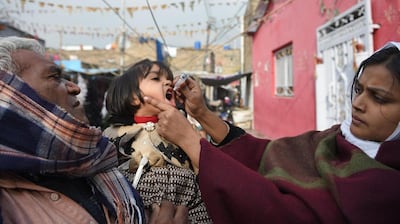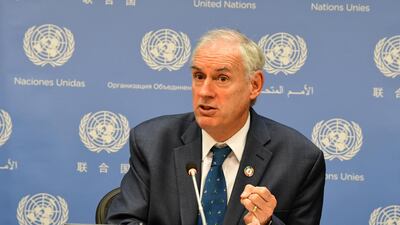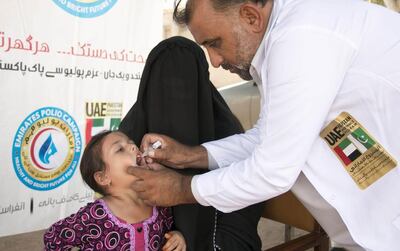The head of Global Institute for Disease Elimination in Abu Dhabi focused on the fight against polio and malaria said funding and commitment is needed to ensure progress does not stall.
Simon Bland was appointed chief executive of Glide, which was announced as a partnership between Sheikh Mohamed bin Zayed, Crown Prince of Abu Dhabi and Deputy Supreme Commander of the UAE Armed Forces, and the Bill and Melinda Gates Foundation.
The institute will focus on eliminating five diseases – polio, malaria, river blindness, lymphatic filariasis and measles – regionally or globally.
Mr Bland previously ran the New York office of the Aids-fighting agency of United Nations and was a senior civil servant in the British government's Department for International Development.
"A decade of malaria progress can be lost in a season. Diseases can rebound quickly and often resurgent disease is more difficult to control – immunity levels are reduced, and anti-microbial resistance is a real and present threat," he said ahead of the Reaching the Last Mile event in Abu Dhabi
The global forum, which will bring together more than 250 health experts and organisations, will hear of progress to end these diseases and seek new pledges of support.
Why are you joining Glide?
Glide will be the first and only institute of its kind in the region and I am very excited to be here to help with the establishment of a lasting institution from the very beginning. Having spent most of the past 40 years living in Africa, Asia and the Pacific, I have seen first-hand the devastating effects when people are left behind without access to the most basic health care.
The world has and is making great progress. The number of children dying before their fifth birthday has fallen, maternal mortality rates have fallen, people are living longer, and we have seen real improvements in tackling some of the world’s biggest infectious killers. But this progress is unfinished, fragile and reversible, and we cannot take it for granted. Despite the progress in reducing the burden of disease, morbidity and mortality remain very high.
The world has eradicated only one human disease – smallpox – and while we may be close to eradicating polio and Guinea worm disease, it will need persistence and continued commitment to get to the end point.
Why is it important for Glide to launch now?
We are at a turning point at which we can begin to consider moving from disease control to elimination efforts. We are within reach of eliminating a number of infectious diseases – but doing so requires new strategies, approaches and delivery systems.
With sustained commitment and investment, the institute can help accelerate country and global progress towards disease elimination, reducing suffering and saving lives.
What is your overall mission and focus?
Globally we seek to accelerate progress towards disease elimination across geographies, to serve as a reference point and to convene powerful forums that lead to increased engagement, new commitments and technical progress.
At the local level we seek to help build a core of regional expertise in infectious disease and public health and provide support for outbreak response efforts.
We remain open to considering where and when we can make a significant contribution to global progress in disease eradication.

What difference do you think Glide can make in disease elimination?
Glide can support, amplify and help sustain elimination efforts for diseases and, in so doing, help save, protect and improve lives.
We sit here at the heart of three continents, Africa, Asia and Europe. We sit in a major global logistics hub, with modern transport, infrastructure, telecommunications and good access to partners working on the front line of primary health.
There is a strong history of philanthropy within the region, its people and culture. There is a commitment at the national level to make the UAE into a positive contributor to development and improving the welfare of people in need across the world. The Abu Dhabi institute can help ensure this legacy continues.
Both His Highness Sheikh Mohamed bin Zayed and Bill Gates have had a long-standing commitment to global health and humanitarian causes. Their long-term vision to save lives and a commitment to eliminate diseases goes back to their partnership in 2011, when they pledged to put an end to polio.
Global health leaders have welcomed the idea of an institute based in the region. We aspire to playing an additive role rather than a duplicative one, working through partnerships at the local, national and global levels.
Here in Abu Dhabi, we will also engage young people through youth councils and academic institutions.
What are the risks of failing to tackle these diseases?
Diseases have an uncanny knack of resurgence. Progress in malaria, TB and HIV are stalling and even regressing in some places. A decade of malaria progress can be lost in a season. Diseases can rebound quickly and often resurgent disease is more difficult to control – immunity levels are reduced, and anti-microbial resistance is a real and present threat.
We heard from Larry Brilliant at the 2017 Reaching the Last Mile Forum about the experiences and lessons of smallpox eradication. Since that remarkable achievement in 1980, there has been extraordinary progress towards the eradication of polio and Guinea Worm Disease. But we are not there yet.

What do you want the experts to take away from this forum?
The attendance at this second forum demonstrates the importance of the region and its collaboration in global health. It is a great example of bringing leaders from around the world to speak explicitly about reaching the last mile and, in so doing, leaving no one behind in our global efforts. Many of the attendees are familiar with the philanthropic and humanitarian support that emanates from the region. My hope is that the audience here leaves inspired and motivated.
Glide is but one part of a broader set of initiatives and partnerships, and we are at the very beginning of our journey towards disease elimination.













